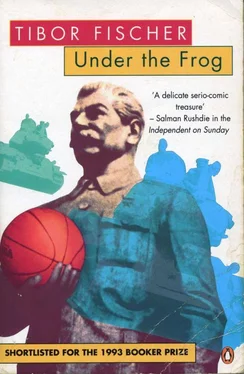Tibor Fischer - Under the Frog
Здесь есть возможность читать онлайн «Tibor Fischer - Under the Frog» весь текст электронной книги совершенно бесплатно (целиком полную версию без сокращений). В некоторых случаях можно слушать аудио, скачать через торрент в формате fb2 и присутствует краткое содержание. Жанр: Современная проза, на английском языке. Описание произведения, (предисловие) а так же отзывы посетителей доступны на портале библиотеки ЛибКат.
- Название:Under the Frog
- Автор:
- Жанр:
- Год:неизвестен
- ISBN:нет данных
- Рейтинг книги:3 / 5. Голосов: 1
-
Избранное:Добавить в избранное
- Отзывы:
-
Ваша оценка:
- 60
- 1
- 2
- 3
- 4
- 5
Under the Frog: краткое содержание, описание и аннотация
Предлагаем к чтению аннотацию, описание, краткое содержание или предисловие (зависит от того, что написал сам автор книги «Under the Frog»). Если вы не нашли необходимую информацию о книге — напишите в комментариях, мы постараемся отыскать её.
Shortlisted for Booker Prize 1993
Set in post-war Hungary between 1944 and 1956, this ferociously funny and bitterly sad story follows the fortunes of two young men in the pursuit of sex and the avoidance of work and army service. They survive the chaos of communism by becoming part of a travelling basketball team.
Under the Frog — читать онлайн бесплатно полную книгу (весь текст) целиком
Ниже представлен текст книги, разбитый по страницам. Система сохранения места последней прочитанной страницы, позволяет с удобством читать онлайн бесплатно книгу «Under the Frog», без необходимости каждый раз заново искать на чём Вы остановились. Поставьте закладку, и сможете в любой момент перейти на страницу, на которой закончили чтение.
Интервал:
Закладка:
The hospitality was unleashed straight away. Gyuri hadn’t seen so much food, so much good food since the point when the war had got noticeably war-like, and it was quite possible that he had never seen that much food in an enclosed space ever before. The depressing thing was that he wouldn’t be able to make up for five years’ going hungry in one evening, however hard he tried. Even the expansive Neumann was looking awed by the food, since people had unmistakeable designs of inflicting several servings on them. If Gyuri tried to slow down his consumption, the villagers who had appointed themselves his personal troop of waiters would hover around and if he ate up, the consumed items would be swiftly replaced. Within half an hour of mastication commencing, Gyuri was already seriously worried about parting company with consciousness: surrounding his enormous plate, which had grown a stalagmite of sausage, cured pork, pig cheese and boxing-glove-sized chunks of bread, were two glasses of wine, one red, one white, two glasses of pálinka, apricot and pear, and two glasses of beer in case he got thirsty. Behind him he could hear enraged villagers fighting to get to his side so they could pour out more of their pressings and distillations.
Ladányi was also offered some refreshment and a selection of food but noticeably halfheartedly. No one wanted to wear out his alimentary muscles. He was principally occupied in giving his hand to be kissed by the queue of people that had formed to pay its respects. Ladányi was far from pleased about this, Gyuri could tell, but the villagers’ veneration was reasonable enough, bearing in mind that there were university professors who were terrified of Ladányi, who would duck into doorways to avoid a searching question from Ladányi, a question that would home in on their ignorance. The story Gyuri had heard was that when Ladányi collected his law degree the faculty offered to throw in a doctorate to save everyone’s time.
The concurred time for the blow-out had been five o’clock, but Faragó and his sidekicks didn’t show up till half past. Ladányi’s request to Gyuri for him to come to Hálás to manage any violence hadn’t been made out of concern for his own safety. ‘The villagers would protect me, and that’s exactly what I don’t want. If things turn nasty, I’d like someone from outside, who won’t have to stay there.’ However Gyuri’s apprehension about roughhousing was completely subsumed in his amazement at Faragó’s appearance.
‘No one’s going to believe us,’ Neumann whispered to Gyuri who concurred with a nod. No amount of assertions that what they were saying was strictly in the bounds of veracity would help, Gyuri knew, when he saw Faragó walk in; no one back in ’ Pest would believe them. Faragó rolled in with two lanky lackeys, a pistol tucked into his waistband. His hue was so ghastly that Gyuri could imagine corpses being dissected by medical students looking fresher. Faragó was drunk. He stank. His suit, a pinstripe, looked as if it had been buried, circa 1932, and only dug up the day before; in any case it clashed with the string vest he had on underneath. His tie was the most successful part of his outfit; it made an eyecatching belt.
The hatred that rose when Faragó entered was so solid, so sinewed, Gyuri was surprised that Faragó was able to walk in. He realised he was going to be treated to something special that evening.
It was hate at first sight for Gyuri which made him reflect that Faragó must have taken the villagers on an almost endless argosy to undreamed-of lands of human anger. This was the absolute zero of human turpitude. He deserved to be exhibited, but it was probably for the best that he was shackled to Hálás. ‘I thought we had it tough,’ observed Neumann taking in Faragó, ‘but the rest of the country should write a thank you letter to Hálás for keeping him here.’ Gyuri had been teasing Ladányi on the train down about how the Church should surely adapt and adopt a forgiving attitude to Faragó and gladly renounce worldly possessions. Smiling quietly, too capable to be caught red-handed with any unjesuit emotions, Ladányi had replied: ‘Whether or not we should have such properties is a good question, as is what should be done with them, but they shouldn’t be handed over to bandits. And while our Lord did enjoin us to turn the other cheek, it should be borne in mind that he never met Faragó.’
‘So the black beetle has come to be crushed by the people’s power?’ roared Faragó, missing the chair he had been aiming to sit on and vanishing from sight. Installed in the chair with the assistance of his seconds, he continued his welcome address. ‘As first Secretary of the Hungarian Communist… the… er… the Hungarian Working People’s Party of the Hálás-Mezómegyer-Murony community and as mayor and as Chairman of the ‘Dizzy with Success’ collective farm, in the words of Comrade Stalin, reporting on the work of the Central Committee to the Eighteenth Congress of the CPSU(B).’ Here Faragó petered out ideologically, paused and having run out of things to say, reached for his pistol to illustrate a point and shot himself in the leg. To general disappointment, it was the wooden leg.
‘And,’ Faragó resumed, ‘and in a scientific manner, with a bolshevik tempo, I’m going to eat you into the ground.’ He snapped his fingers and the proprietor of the csárda approached the table and erected an enormous balance with scales. ‘They used that in the Békés county fried-chicken championships,’ someone interjected in Gyuri’s ear, as the proprietor measured out two vast bowls of steaming bean soup for the kick-off. Ladányi had said nothing more than ‘good evening’ so far, while Faragó continued to glasshead, letting everyone see his thoughts. ‘You’re trying to impress us, aren’t you? You think you can carry on sucking the blood of the people, you leech in a dog collar?’ Here Faragó halted as his eye chanced upon the village gypsy standing in the front row with a good view of the proceedings. Emitting a thoracic-cleaning rasp, Faragó then expectorated a slab of phlegm so huge and forceful that the unsuspecting gypsy was knocked sideways. ‘No gypsies,’ Faragó elaborated. Which Gyuri found odd since Faragó looked more gypsy than the village gypsy, with an extended stomach of such paunchity you might think he had a huge watermelon stuffed under his vest; his nose had gone in for extra growth as well, hanging like an overripe raspberry. Gut and conk were unimpeachable witnesses to Faragó’s feasting in lean times; he saw himself as an omnivore, as a megalovore, for whom eating was a measure of virility. Faragó had no doubt he would leave his opponent stalled on the first course.
Ladányi said grace and Faragó retaliated by clenching his fist and growling the communists’ salutation: ‘Freedom!’. It was obvious who the crowd was backing on this occasion, Gyuri thought, as the two contestants started to shovel in the bean soup but it wasn’t always easy to sort out who to back in the Rome vs. Moscow conflict. The Church in Hungary was heading for a kicking indisputably. Mindszenty, the Cardinal, was stuck in a nick somewhere in Budapest, while they adjusted the charges to get a good fit (Gábor Pétér, the head of the AVO, had been a tailor): spying for the Americans, plotting to bring back the Habsburg monarchy, breeding Colorado beetles, sneering at socialist realist novels. And they must have had the survivors from the scriptwriting teams from Hungary ’s prewar film industry on contract to concoct the evidence, because no policeman could invent as fantastically as that.
It was hard to sympathise with the Cardinal, Gyuri reflected, because Mindszenty was a buffoon, however wronged. The Catholic Church in Hungary wasn’t topheavy with brilliance. It would be so nice to have a real choice, fumed Gyuri. It was like Hungary being between Germany and the Soviet Union. What sort of choice was that? Which language would you like your firing squad to speak? In these circumstances, of course, a brilliant Cardinal might not be any more useful. Being clever and far-sighted wasn’t always of use. Does it help being the clever pig on the way to the abattoir?
Читать дальшеИнтервал:
Закладка:
Похожие книги на «Under the Frog»
Представляем Вашему вниманию похожие книги на «Under the Frog» списком для выбора. Мы отобрали схожую по названию и смыслу литературу в надежде предоставить читателям больше вариантов отыскать новые, интересные, ещё непрочитанные произведения.
Обсуждение, отзывы о книге «Under the Frog» и просто собственные мнения читателей. Оставьте ваши комментарии, напишите, что Вы думаете о произведении, его смысле или главных героях. Укажите что конкретно понравилось, а что нет, и почему Вы так считаете.












